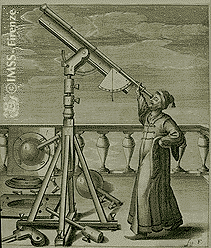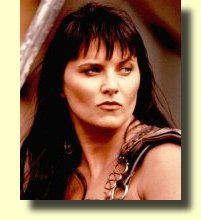
The phones are ringing off the hook. The latest Pluto news.
There goes the solar system.
Once an elite society of nine lordly bodies of rock, ice and gas, our solar system would grow to at least 12 members under a new definition of a planet proposed Tuesday by the International Astronomical Union.
The core of the definition? Planets are round. And they orbit a star.
The proposal was hammered out after two years of intense debate among leading experts of the IAU, which is the sole authority on Earth for naming celestial objects.
"We now have a new way to put the solar system together," said Richard Binzel, a member of the IAU executive committee that drafted the definition. "We think this definition is reasonable."
The proposal will be voted on next week by the group's general assembly, which is meeting in Prague, Czech Republic. Binzel, an astronomer at the Massachusetts Institute of Technology, said he was "optimistic" the definition would be approved.
The new list of round planets would consist of one recently discovered object beyond the orbit of Pluto named UB313, as well as two bodies that previously were rejected for planetary status: Pluto's moon Charon and Ceres, the largest member of the asteroid belt between Mars and Jupiter.
Charon and Pluto would become the solar system's first double-planet, meaning they twirl around each other but neither dominates.
They would become part of a new subclass of planets called "plutons," defined by the fact that their orbits around the sun take at least 200 years. Dozens more plutons could be added after the objects are more thoroughly reviewed by the IAU.
Ceres also would get a new designation as the sole member of a subclass called "dwarf planets."
Gibor Basri, chairman of astronomy at the University of California, Berkeley, praised the IAU for coming up with a reasonable definition that could help quell the stubborn arguments over what makes a planet, a debate provoked by critics who questioned tiny Pluto's status as a planet.
"I feel that they have made the most rational and scientific choices," he said. "It does mean some adjustment for the public."
But the definition has riled some astronomers.
Perhaps surprisingly, one of the strongest critics of the new solar-system lineup is the man who discovered one of the proposed new planets, astronomer Michael Brown of the California Institute of Technology. He called the decision an "odd solution."
"In my book, the word planet was special. I liked it back when planets meant something other than: It's round," he said.
Brown said he had counted 53 objects that appeared to meet the proposed definition of a planet.
It's an open question how the new definition will be received by the general public, which grew up with mobiles of the nine-planet solar system in their bedrooms, and learning mnemonic devices to memorize the planets, such as My-Very-Excellent-Mother-Just-Served-Us-Nine-Pizzas.
The debate over what is and is not a planet was forced on the astronomical union by the recent discoveries of a new roster of Kuiper Belt objects orbiting as far as 9 billion miles from the sun.
Among the numerous objects, Brown identified one in 2005 — UB313 (he nicknamed it Xena) — that appeared larger than Pluto, which has a diameter of 1,400 miles.
The discoveries by Brown and astronomers at the Lowell Observatory in Arizona made it clear that the small, icy world of Pluto, discovered in 1930 by Clyde Tombaugh, was hardly unique.
Something had to be done.
Many scientists advocated demoting Pluto, which would have left eight planets: the four inner rocky worlds of Mercury, Venus, Earth and Mars, and the four outer gas giants, Jupiter, Saturn, Uranus and Neptune.
It was a simple approach, and one that Brown himself favored. "A gutsy move would be to bite the bullet and say that Pluto should never have been called a planet," he said.
In the end, the IAU took a slightly more nuanced approach.
Its proposal reads: "A planet is a celestial body that (a) has sufficient mass for its self-gravity to overcome rigid body forces so that it assumes a hydrostatic equilibrium (nearly round) shape, and (b) is in orbit around a star, and is neither a star nor a satellite of a planet."
The IAU estimates that a planet would have to be at least 480 miles in diameter to have the necessary mass to form itself into a round shape.
"Our goal was to find a scientific basis for a new definition of planet, and we chose gravity as the determining factor," Binzel said. "Nature decides whether or not an object is a planet."
 Hmmm...53 planets. That would take a long mnemonic. I was happy that they quoted me on the mom serving pizzas (although they got it wrong). This really has me losing serious sleep. How in the WORLD are our kids going to learn the names of 53 planets?? One of them is going to be named XENA, for PETE's SAKE.
Hmmm...53 planets. That would take a long mnemonic. I was happy that they quoted me on the mom serving pizzas (although they got it wrong). This really has me losing serious sleep. How in the WORLD are our kids going to learn the names of 53 planets?? One of them is going to be named XENA, for PETE's SAKE.We should have guessed that planets would be a growth industry. My cousin told me last month, "Rob, invest in planets. I have some inside information from Prague that there are some BIG things in the works." Well stupid me, I stayed away from this tip and now look what has happened! I think this news alone got the Dow Jones shooting up to record highs. I mean, how many days are new planets added to the roster?
Maybe now that this is settled they can get to renaming Uranus (no not yours, the planet). It is just EMBARRASSINGNG to say. Especially when you say things like "Uranus has rings around it" or "Uranus has a methane gas atmosphere" or worst of all, "NASA just sent a probe to Uranus." I don't even like to think about that stuff.
So I can see us when we are old, talking to the grandchildren, "Yeah, I remember when there were only NINE planets. We even thought we would lose good ol' Pluto one day, but then all heck broke loose and they just let any ol' round rock become a planet. All this riff-raff in the solar system these days. It used to be that being a planet was something special, but not anymore!" I can't wait to bore my grandchildren with that one.


